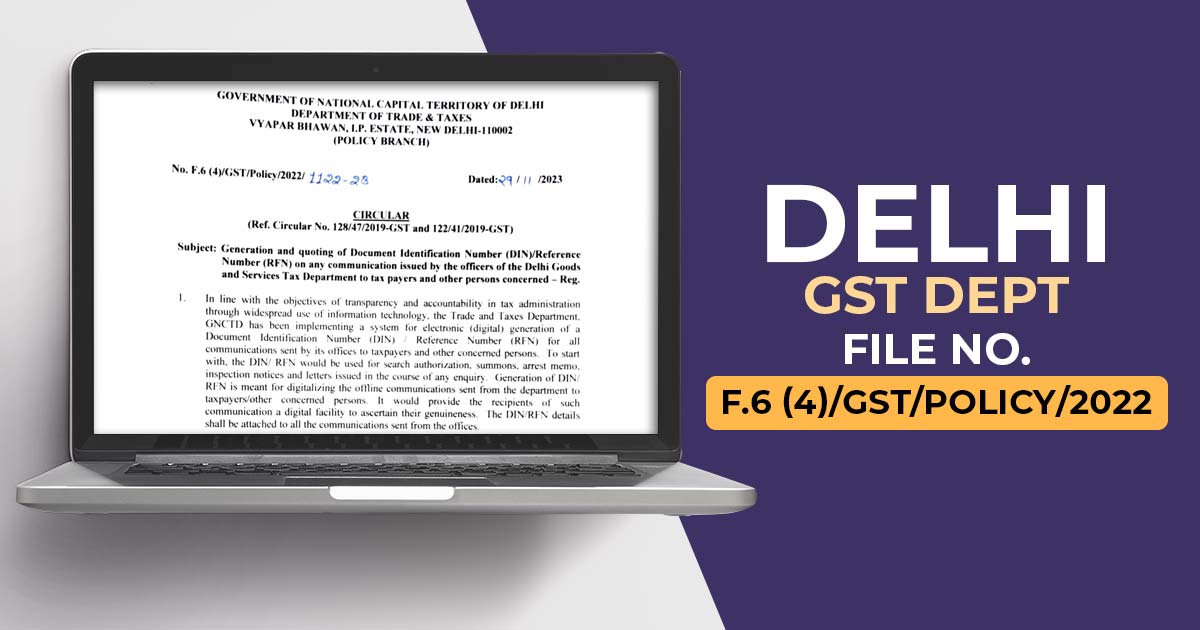
The Delhi GST Department released a circular dated November 29, 2023 (F.6 (4)/GST/Policy/2022/ 1122-23) addressing the necessity of generating and citing Document Identification Number (DIN) or Reference Number (RFN) on all correspondence issued by officers of the Delhi Goods and Services Tax (GST) Department to taxpayers and relevant parties.
Aligned with the pursuit of fostering transparency and accountability in tax administration through the extensive utilization of information technology, the Trade and Taxes Department, GNCTD, has been actively implementing an electronic (digital) system for generating a Document Identification Number (DIN) / Reference Number (RFN) for all communications dispatched by its offices to taxpayers and concerned individuals.
Initially, the DIN/RFN will be employed for search authorizations, summons, arrest memos, inspection notices, and letters issued during inquiries. The generation of DIN/RFN aims to digitize offline communications dispatched from the department to taxpayers and other involved individuals.
This measure will grant recipients of such communication a digital means to verify their authenticity. The details of the DIN/RFN will be attached to all communications dispatched from the offices.
Under section 168 of the Delhi Goods and Services Tax Act, 2017, the Principal Commissioner (State Tax) has directed that all communications related to search authorizations, summons, arrest memos, inspection notices, and inquiry letters must bear a computer-generated Document Identification Number (DIN)/Reference Number (RFN).
This number should be prominently displayed within the body of the communication. The GST BO portal’s officer login page provides the functionality to generate DIN/RFN.
While DIN/RFN is mandatory, in exceptional cases, communications may be issued without an auto-generated DIN/RFN. However, this allowance can only be exercised after providing written reasons in the relevant file. Additionally, any such communication issued without a DIN/RFN must explicitly mention this fact.
Important:- Kerala Govt Releases SOP via File No.SGST/973/2023-LEGAL3 for IBC Cases
The specific urgent circumstances where a communication may be sent without an electronically generated DIN/RFN include:
- At the time of technical issues in generating the electronic DIN/RFN, or
- When the communication for the investigation/inquiry, verification others is needed to get provided at short notice or in urgent cases, and the authorized officer when outside the office in the release of his official duties.
Additionally, notices, orders, and official communications sent through the GST backend system by SGST officers and intended for the taxpayer via the GSTN Portal are exempt from requiring a DIN/RFN generation. However, this exemption does not apply to any manually issued communication under any circumstances.
Any specific communication lacking an electronically generated DIN/RFN, not falling under the exceptions stated in paragraphs 3 and 4, will be considered invalid and treated as if it was never issued.
Communications issued without an electronically generated DIN/RFN, as per the conditions in paragraph 4, must be regularized within 15 working days from the date of issuance. By:
- Seeking retroactive approval from the immediate superior officer regarding the rationale behind issuing the communication without the electronically generated DIN/REN:
- Compulsory electronic generation of the DIN/RFN following retroactive approval; and
- Producing the electronically generated template with the DIN/RFN and storing it in the relevant file.
Recommended:- Delhi High Court Orders Reconsideration and Revocation
The electronic creation of DIN/RFN for official correspondence with taxpayers and other relevant individuals represents a groundbreaking step. It’s emphasized that any document issued without an electronically generated DIN/RFN will be considered invalid and null.
Hence, it is crucial for all involved officers to strictly follow these directives. Recipients can verify the authenticity of the communication by entering the DIN/RFN on the GST Portal.
Moreover, concerning VAT-related papers, the DVAT Portal offers the capability to generate RFN. Recipients can confirm the authenticity of the communication by visiting the website https://dvat.gov.in/website/home.html (view RFN).









